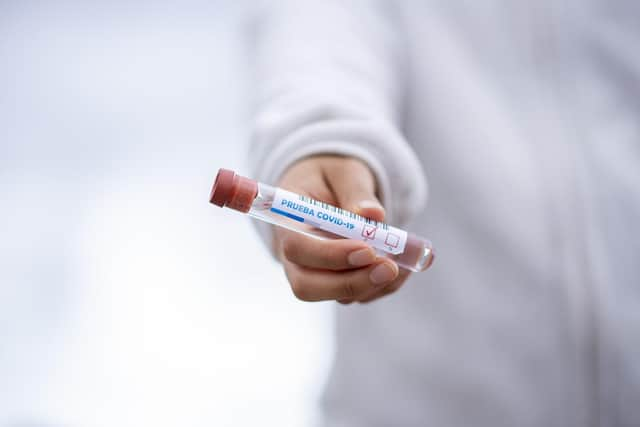Your Covid questions answered


In the absence of formal restrictions in England, many families have already opted to scale back plans for the festive season in the wake of rising case rates.
Scotland and Wales have both announced new rules on mixing and events will come into force from Boxing Day.
Advertisement
Hide AdAdvertisement
Hide AdBut with Omicron poised to become Northumberland’s dominant variant as infections surge, Liz Morgan, the county’s director of public health, has called on households to stick to existing guidelines to “protect” each other and slow the spread of the disease.
Here is a brief Q&A with Ms Morgan, where she answers some key questions about the ongoing pandemic:
What is the current Covid situation in Northumberland?
Currently in Northumberland there are more than 500 cases per 100,000 people.
There have been over 1,600 new cases in the last seven days, which is really concerning, and the data suggests an increasing proportion of those cases are Omicron.
Advertisement
Hide AdAdvertisement
Hide AdNationally, cases of the new variant are rapidly increasing, and community transmission is now becoming established in all parts of England.
What possible measures or restrictions are you preparing for?
We know that Omicron spreads much more easily than the Delta variant, especially within households.
I would urge everyone to follow the latest government guidance and keep taking those simple precautions to stay safe.
Advertisement
Hide AdAdvertisement
Hide AdEveryone has a part to play in preventing the spread of Covid.
What impact could rising cases have on essential services and should the public be doing anything to prepare for that?
Breaking chains of infection as quickly as possible prevents the virus from spreading and this works, irrespective of which variant is in circulation.
One of the quickest ways of doing this is for individuals who test positive to self-isolate immediately.
Advertisement
Hide AdAdvertisement
Hide AdThose other things that we’ve been encouraging people to do remain incredibly important:
Wearing face coverings where required and in busy places Frequent hand washing Self-isolate and book a PCR test straight away if you develop symptoms Work from home wherever that’s possible Keep indoor rooms well ventilated
This will make a significant difference, but to have the most impact it requires as many of us as possible to do all these things, as much as we can.
Hospitals and GPs are busy at this time of year. As well as managing usual illnesses and Covid, hospitals and primary care services are also doing a huge amount of work supporting the vaccination programme.
Advertisement
Hide AdAdvertisement
Hide AdAs well as following Covid guidance, we can all help by using health services appropriately and using NHS 111 and community pharmacies for minor ailments.
There’s a big focus on Christmas Day, but what is likely to happen after that?
We await government guidance on this.
Many will be feeling fatigued, like it’s Groundhog Day again after last year – what is your advice to the public over the festive period?
We know that people will be feeling weary and that everyone will be looking forward to Christmas.
Advertisement
Hide AdAdvertisement
Hide AdSo that we can all enjoy Christmas and protect our families and friends our advice is to continue to be cautious over the holiday period.
We’re asking people to think about limiting their social contacts to those which are most important to them, to protect elderly or vulnerable relatives they may see over the Christmas and New Year period.
Vaccination is the bedrock in protecting our population, so we continue to urge people to come forward for both doses of the vaccine and the booster as soon as they’re offered it.
Making use of Lateral Flow Device self-testing kits (LFTs) just before and after any social contacts will also help to ensure residents aren’t spreading Covid without realising it.
Advertisement
Hide AdAdvertisement
Hide AdTransmission is based on frequency and proximity of our social contacts, so we need to think about prioritising the contacts that matter to us.
What is your message to anyone who may feel tempted to cut corners or break rules/guidance – such as by turning contact tracing off on their phone or not getting possible symptoms tested – because they don’t want to risk ruining their family Christmas again?
Everyone has a part to play in preventing the spread of Covid and if symptoms are ignored, there is a real risk that infection could be passed on either directly or indirectly to someone you don’t necessarily know, but who could become extremely unwell or even die.
The more we all do the simple things and do them well and consistently, the more likely we are to limit the spread of infections and keep ourselves and our loved ones safe.
What is the plan for the return of schools in the New Year?
Advertisement
Hide AdAdvertisement
Hide AdThe Department for Education has written to secondary schools to ask them to prepare for on-site testing in the new year.
Pupils will take one test on-site as they return to school, followed by another at home three to four days later.
A record 119,789 new infections were reported in the UK yesterday (Thursday).
Dr Jenny Harries, head of the UK Health Security Agency said: "What we have got now is a really fine balance between something that looks like a lower risk of hospitalisation - which is great news - but equally a highly transmissible variant and one that we know evades some of our immune defences, so it is a very balanced position.”